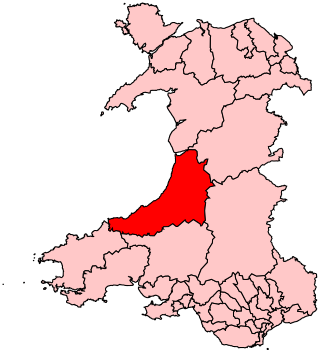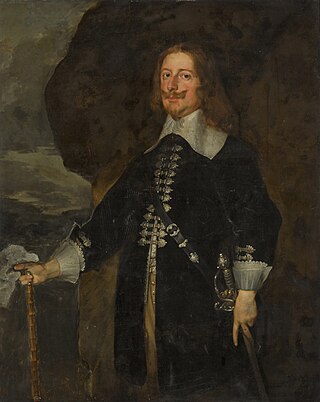Related Research Articles

Ceredigion is a parliamentary constituency represented in the House of Commons of the UK Parliament. Created in 1536, the franchise expanded in the late 19th century and on the enfranchisement of women. Its boundaries remained virtually unchanged until 1983. From 1536 until 1885 the area had two seats : a county constituency (Cardiganshire) comprising the rural areas, the other the borough constituency known as the Cardigan District of Boroughs comprising a few separate towns; in 1885 the latter was abolished, its towns and electors incorporated into the former, reduced to one MP. The towns which comprised the Boroughs varied slightly over this long period, but primarily consisted of Cardigan, Aberystwyth, Lampeter and Adpar, the latter now a suburb of Newcastle Emlyn across the Teifi, in Carmarthenshire.

Colonel Philip Jones was a Welsh military leader and politician who sat in the House of Commons between 1650 and 1656. He rose to the rank of Colonel in the service of the Parliamentary Army under Fairfax during the English Civil War. As Governor of Swansea he successfully held the town against the Royalist forces.
James Philipps was a Welsh politician who sat in the House of Commons between 1653 and 1662. He was a supporter of the Parliamentary cause during the English Civil War.
John Clarke, also known as John Clark, John Clerk, and John Clerke, was an English politician and Justice of the Peace who sat in the House of Commons from 1653 through 1660, and was a colonel in the Parliamentary army between 1651 and 1659.

Richard Herbert, 2nd Baron Herbert of Chirbury was an Anglo-Welsh Member of Parliament, a Royalist who fought with the rank of colonel in the English Civil War, and a peer whose membership of the House of Lords was curtailed by its abolition in 1649.
Sir John Pryce, 1st Baronet, sometimes also spelt Price, was an Anglo-Welsh Baronet and Member of Parliament.
Sir Francis Lloyd was a Welsh politician who sat in the House of Commons from 1640 to 1644. He fought in the Royalist army in the English Civil War.
Walter Lloyd (1580–1661) was a Welsh politician who sat in the House of Commons from 1640 to 1644. He supported the Royalist cause in the English Civil War.

Sir John Carter was an English soldier, politician and administrator from Buckinghamshire, who served in the Parliamentarian army during the Wars of the Three Kingdoms. He settled in Denbighshire and was a Member of Parliament at various times between 1654 and 1660.
Arthur Owen was a Welsh politician who sat in the House of Commons at various times between 1645 and 1678. He fought in the Parliamentary army in the English Civil War.
George Gwynne was a Welsh politician who sat in the House of Commons at various times between 1654 and 1660.
Henry Herbert was a Welsh politician who sat in the House of Commons of England between 1642 and 1654. He fought in the Parliamentary army in the English Civil War.
Edward Herbert was an English politician who sat in the House of Commons in 1656. He was a prominent supporter of Oliver Cromwell.

Sir Erasmus Philipps, 3rd Baronet was a Welsh politician who sat in the House of Commons in 1654 and 1659.
Rowland Dawkins was a Welsh military colonel and politician who sat in the House of Commons at various times between 1654 and 1656. He was a zealous supporter of the Commonwealth.
John Price was a Welsh politician who sat in the House of Commons between 1654 and 1659.
John Blackmore was an English politician who sat in the House of Commons in 1654.
This article is about the particular significance of the year 1713 to Wales and its people.

Walter Lloyd, of Peterwell, Cardiganshire, was a British lawyer and Whig politician who sat in the House of Commons from 1734 to 1742.
John Lloyd of Peterwell, Cardiganshire, was a British lawyer and Whig politician who sat in the House of Commons from 1747 to 1755.
References
- 1 2 3 Williams, William Retlaw (1895). The parliamentary history of the principality of Wales, from the earliesr times to the present day, 1541-1895, comprising lists of the representatives, chronologically arranged under counties, with biographical and genealogical notices of the members, together with particulars of the various contested elections, double returns and petitions. Cornell University Library. Brecknock : Priv. Print. for the author by E. Davis and Bell.
- ↑ Willis, Browne (1750). Notitia Parliamentaria, Part II: A Series or Lists of the Representatives in the several Parliaments held from the Reformation 1541, to the Restoration 1660 ... London. pp. 229–239.